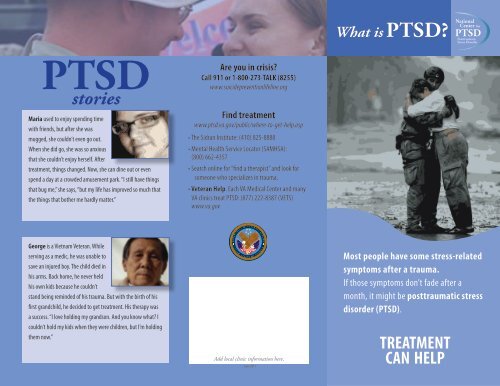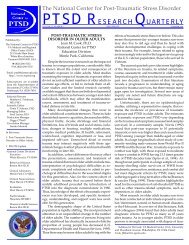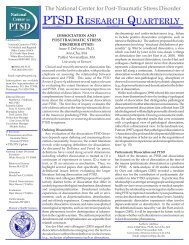What is PTSD Brochure - National Center for PTSD
What is PTSD Brochure - National Center for PTSD
What is PTSD Brochure - National Center for PTSD
You also want an ePaper? Increase the reach of your titles
YUMPU automatically turns print PDFs into web optimized ePapers that Google loves.
<strong>What</strong> <strong>is</strong> <strong>PTSD</strong>?<br />
<strong>PTSD</strong><br />
stories<br />
Maria used to enjoy spending time<br />
with friends, but after she was<br />
mugged, she couldn’t even go out.<br />
When she did go, she was so anxious<br />
that she couldn’t enjoy herself. After<br />
treatment, things changed. Now, she can dine out or even<br />
spend a day at a crowded amusement park. “I still have things<br />
that bug me,” she says, “but my life has improved so much that<br />
the things that bother me hardly matter.”<br />
Are you in cr<strong>is</strong><strong>is</strong>?<br />
Call 911 or 1-800-273-TALK (8255)<br />
www.suicidepreventionlifeline.org<br />
Find treatment<br />
www.ptsd.va.gov/public/where-to-get-help.asp<br />
• The Sidran Institute: (410) 825-8888<br />
• Mental Health Service Locator (SAMHSA):<br />
(800) 662-4357<br />
• Search online <strong>for</strong> “find a therap<strong>is</strong>t” and look <strong>for</strong><br />
someone who specializes in trauma.<br />
• Veteran Help. Each VA Medical <strong>Center</strong> and many<br />
VA clinics treat <strong>PTSD</strong>: (877) 222-8387 (VETS)<br />
www.va.gov<br />
George <strong>is</strong> a Vietnam Veteran. While<br />
serving as a medic, he was unable to<br />
save an injured boy. The child died in<br />
h<strong>is</strong> arms. Back home, he never held<br />
h<strong>is</strong> own kids because he couldn’t<br />
stand being reminded of h<strong>is</strong> trauma. But with the birth of h<strong>is</strong><br />
first grandchild, he decided to get treatment. H<strong>is</strong> therapy was<br />
a success. “I love holding my grandson. And you know what? I<br />
couldn’t hold my kids when they were children, but I’m holding<br />
them now.”<br />
Add local clinic in<strong>for</strong>mation here.<br />
June 2011<br />
Most people have some stress-related<br />
symptoms after a trauma.<br />
If those symptoms don’t fade after a<br />
month, it might be posttraumatic stress<br />
d<strong>is</strong>order (<strong>PTSD</strong>).<br />
treatment<br />
can help<br />
June 2011
<strong>PTSD</strong><br />
Cognitive Processing Therapy (CPT)<br />
Prolonged Exposure Therapy (PE)<br />
Stress Inoculation Training (SIT)<br />
Eye Movement Desensitization and<br />
Reprocessing (EMDR)<br />
Selective Serotonin Reuptake<br />
Inhibitors (SSRIs)<br />
Treatment<br />
Treatments <strong>for</strong> <strong>PTSD</strong> include psychotherapy (counseling) and medication. Sometimes, the two<br />
are used together. Cognitive behavioral therapy (CBT) <strong>is</strong> the best treatment <strong>for</strong> <strong>PTSD</strong>. There are<br />
different types of CBT, including Cognitive Processing Therapy and Prolonged Exposure.<br />
Psychotherapy/Counseling<br />
CPT teaches you how to identify trauma-related thoughts and change them so they are<br />
more accurate and cause less d<strong>is</strong>tress.<br />
In PE, you talk about your trauma over and over until the memories no longer upset you.<br />
You also go to places that are safe, but that you have been staying away from because they<br />
are related to the trauma.<br />
SIT teaches patients a set of skills they can use to manage their anxiety. These skills might<br />
include relaxation, thought stopping, and positive self-talk.<br />
EMDR involves thinking about images and feelings that d<strong>is</strong>tress you while doing rapid eye<br />
movements.<br />
Medications*<br />
SSRI’s ra<strong>is</strong>e the level of serotonin in your brain. Th<strong>is</strong> can make you feel better. The two SSRIs<br />
that are approved by the FDA <strong>for</strong> <strong>PTSD</strong> are sertraline (Zoloft) and paroxetine (Paxil).<br />
*Some doctors prescribe benzodiazepines or “benzos” <strong>for</strong> people with <strong>PTSD</strong>. They are often given to people who have anxiety. While they may be of some<br />
help at first, these drugs do not treat the core <strong>PTSD</strong> symptoms. They may lead to addiction and are not recommended <strong>for</strong> long-term <strong>PTSD</strong> treatment.<br />
<strong>PTSD</strong> Screening<br />
Only a mental health or medical professional can tell you if you have <strong>PTSD</strong>. If you went through a<br />
trauma and answer “yes” to at least three of the questions below, you should have a <strong>PTSD</strong> evaluation.<br />
In your life, have you ever had any experience that was so frightening, horrible, or upsetting that, in the past month, you:<br />
q Have had nightmares about the experience or thought about it when you did not want to?<br />
q Tried hard not to think about the experience or avoided situations that reminded you of it?<br />
q Were constantly on guard, watchful, or easily startled?<br />
q Felt numb or detached from others, activities, or your surroundings?<br />
<strong>PTSD</strong><br />
Symptoms<br />
4 Reliving the event<br />
Memories of the trauma can come back at any<br />
time and can be triggered by reminders of what<br />
happened. You may have bad dreams, or feel like you<br />
are going through the trauma again.<br />
4 Avoiding situations that<br />
remind you of the event<br />
You may try to avoid places, people or things that<br />
bring back memories of the event.<br />
4 Feeling numb<br />
You may find it hard to express your feelings. You<br />
may feel d<strong>is</strong>tant or cut off from others.<br />
4 Feeling keyed up<br />
You may be on the lookout <strong>for</strong> danger. You might<br />
become angry very easily.<br />
Other problems following trauma<br />
If you have <strong>PTSD</strong> you may also feel guilt, shame or<br />
depression. Problems with coworkers, friends, and loved<br />
ones are common. Many people with <strong>PTSD</strong> abuse alcohol<br />
or drugs. Often, <strong>PTSD</strong> treatment can help these problems,<br />
too. The coping skills you learn to deal with <strong>PTSD</strong> work in<br />
other areas of your life.






